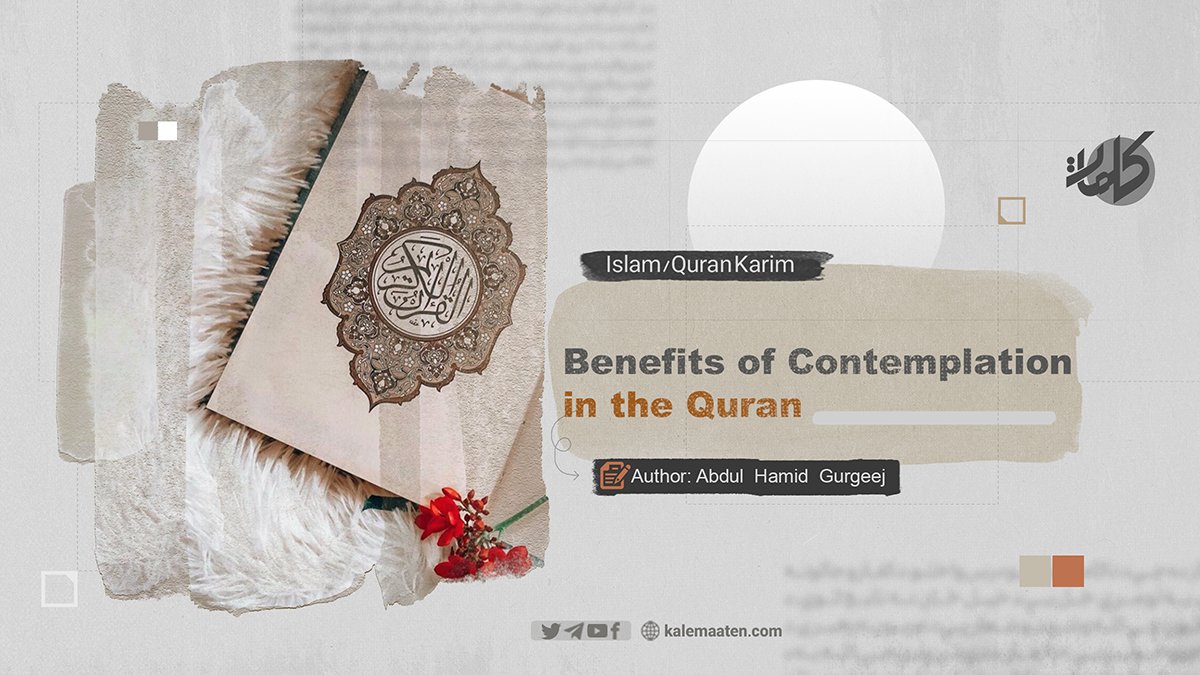
Author: Abdul Hamid Gurgeej
Benefits of Contemplation in the Quran
The Qur’an is the greatest and most sacred divine treasure, a spiritual reserve, and the beating heart of the Islamic world. Among all sacred and revealed books, it stands unparalleled. It is the foundation of Islamic civilization, a catalyst of one of the greatest spiritual revolutions in history and continues to illuminate the cultural life of the Muslim world.
However, this enlightenment and transformative power are not achieved merely through its outward recitation, but through deep reflection on its meanings and careful contemplation of its concepts.
Allah, the Almighty, states the purpose of the Qur’an’s revelation: كِتابٌ أَنْزَلْناهُ إِلَيْكَ مُبارَكٌ لِيَدَّبَّرُوا آياتِهِ وَ” لِيَتَذَكَّرَ أُولُوا الْأَلْبابِ” Translation: “This is a blessed Book We have revealed to you so that they may reflect upon its verses and that those of understanding may take heed.”
In this verse, the purpose of the Qur’an’s revelation is explicitly stated as deep contemplation of its verses. Reflection upon the Book of Allah is the key to all knowledge and wisdom, the source of every goodness and blessing in life. Through contemplating the meanings of the Qur’anic words, the tree of faith grows strong, full of leaves and abundant in fruit.
By pondering over the Qur’an, one can truly come to know his Lord, Creator, and Master, finding the path to success in both this world and the Hereafter. Through deep reflection, one distinguishes between true friends and real enemies and gains the ability to discern between good and evil. It also provides insight into the traits that elevate a person to perfection or drag him into disgrace.
As Imam Ibn al-Qayyim al-Jawziyyah (may Allah have mercy on him) wrote:
“The purpose of reciting the Qur’an is to understand its verses, contemplate its meanings, and act upon its teachings. The recitation and memorization of its verses serve as a means to reach the understanding of its meanings and concepts.”
As one of the righteous predecessors of this Ummah once said: «نَزَلَ القُرآنُ لِيُعمَل به، فاتِّخِذُوا تلاوتَه عَملاً» Translation: “The Qur’an was revealed so that its teachings would be acted upon, so use its recitation as a bridge to action.”
Thus, true followers of the Qur’an are those who understand and live by its teachings, even if they have not memorized the text. On the other hand, someone who recites the Qur’an from memory in all fourteen modes of recitation and pronounces its letters with perfect precision, yet fails to act upon its message, is not truly among the people of the Qur’an.
It has been said: Since faith in Allah, the Almighty, is the greatest of deeds, and since understanding the Qur’anic sciences and reflecting upon its verses strengthens faith, then deep contemplation of the Qur’an is also among the greatest of deeds. Otherwise, mere recitation without comprehension or reflection can be performed by both the righteous and the wicked, the believer and the hypocrite alike. (Zad al-Ma’ad, 1:327)
Additionally, in Miftah Dar al-Sa‘adah (1:187), it is written:
“In summary, nothing benefits the heart more than reciting the Qur’an with reflection and contemplation. This is because pondering over its verses encompasses all the spiritual stations of seekers, the states of the righteous, and the ranks of the gnostics. Reflection upon the Qur’an nurtures love, passion, awe, hope, humility, servitude, reliance, devotion, submission, contentment, gratitude, patience, and all other qualities essential for spiritual growth and the vitality of the heart. If people truly realized the benefits of reciting the Qur’an with deep contemplation, they would abandon everything else and devote themselves entirely to it. The one who recites the Qur’an with reflection, upon encountering a verse that heals his heart, may repeat it a hundred times out of love and yearning—perhaps even spending an entire night absorbed in a single verse. Thus, the recitation of a single verse with contemplation and understanding is far more beneficial for purifying the heart, strengthening faith, and tasting the sweetness of the Qur’an than completing an entire recitation without reflection and comprehension.”
Hafiz Shirazi (may Allah have mercy on him) beautifully expresses this:
“O Hafiz, in the corner of poverty and the solitude of dark nights,
As long as your constant remembrance is prayer and the study of the Qur’an, grieve not.”


